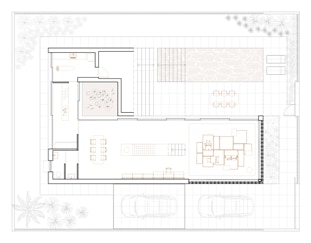Private house
Dubai, United Arab Emirates
The project proposes a replicable housing template, intended for Emirati citizens living in Dubai, a city open to the future, where innovation, technology and international design are the protagonists and at the same time a city with a historical, architectural and cultural heritage to pass on. The research path took into consideration this dual spirit of the city of Dubai, the local architectural and construction tradition, as well as the climatic conditions of the context. The design path was oriented towards unprecedented expressive qualities of the material, with a tension towards the synthesis of the design gesture between tradition and innovation, memory and contemporaneity.
The project involves the application of sustainable construction solutions with low energy consumption and high living comfort in the Dubai environment, characterized by a sub-tropical climate with an average summer temperature of 35°C and daily peaks of up to 55°C, as well as a relative humidity of up to 90%. The building must be energetically self-sufficient through the use of renewable energy sources.
The project satisfies functional requests and reinterprets the residential philosophy of the Middle East in a contemporary key. At the same time it takes into account the need to reduce solar gains, without giving up natural interior lighting.
The planned plant solutions are:
- solar panels;
- thermal collectors;
- heat pump;
- floor cooling;
- mechanical ventilation with dehumidification;
- recycling of rainwater and gray water;
- home automation control system.
In this way and through an integrated executive design (building and systems) it is possible to reach an energy standard where the total annual consumption of primary energy is equal to the production on site. So called ZEB - Zero Energy Building.
A water recycling system is provided for toilet flushing and garden irrigation. The system consists of a dedicated plant including water tanks, pumps, water treatment and associated piping distribution system.
As a type of renewable energy, solar energy is clean and secure. Dubai receives approximately 3.000 hours of sunshine annually. DEWA (Dubai Electricity and Water Authority) encourages the use of solar energy to reduce reliance on traditional energy sources (such as gas, oil and coal). Where a building incorporates on-site generation of electricity from a solar photovoltaic system, you can opt for a grid-connected solar system or an off-grid solar system.
District cooling in Dubai centralizes the production and distribution of cooling energy and It distributes cooling capacity in the form of chilled water from a central source to the building through a network of underground pipes. District Cooling is an energy-efficient air-conditioning system as it saves up to 35% energy compared to traditional air-conditioning systems. In this way, it reduces carbon footprint by increasing energy efficiency and reducing environmental emissions.
The project applies the principles of biophilic design, a way of designing that favors the intrinsic need that people have to stay connected to life and its processes. These principles can be summarized as follows: great presence of natural light, airy environments, use of natural materials and spaces dedicated to vegetation. The building and its spaces, designed according to these principles, help to lighten the human cognitive system, favor the sensory one and act as a regulator of extreme psychological states, avoiding both depression and exciting effects. They also work to strengthen the neural level in emotional and biological terms, and also have beneficial effects on the immune system.
Project
Massimiliano Gamba
Chronology
Project: 2023














































